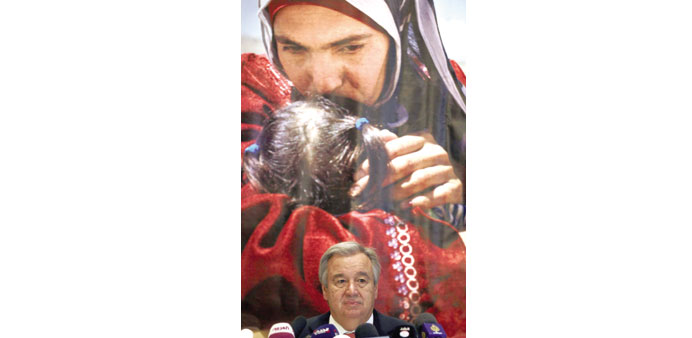Guterres speaks during the press conference in Amman yesterday.
Thousands of Syrian refugee women are caught in a “spiral of hardship, isolation and anxiety”, widowed or separated from their husbands and struggling to survive, the UN said yesterday.
In a new report, the UN agency for refugees UNHCR highlighted the plight of some 145,000 Syrian refugee women who are fending for themselves and their families in dire circumstances across the Middle East.
“Forced to take sole responsibility for their families after their men were killed, captured or otherwise separated, they are caught in a spiral of hardship, isolation and anxiety,” said the report, unveiled by UNHCR chief Antonio Guterres at an Amman news conference.
Guterres said Syrian refugee women “are suffering enormously” and appealed for more funds to help them.
“We need to enhance our direct cash support to vulnerable families and that is a very important instrument... unfortunately this is a very expensive protection and assistance instrument,” he said.
“We are still lacking $200mn until the end of the year to be able to extend this programme of cash assistance to families in the way that covers the needs of the most vulnerable ones.”
The primary difficulty facing refugee women is lack of resources, with most struggling to pay rent and buy food, resorting to selling possessions, including wedding rings, and sending children out to work.
Most are unable to work because they are the sole caregivers for their children, and a third of the 135 women surveyed by UNHCR in Jordan, Lebanon and Egypt said they do not have enough to eat.
One woman interviewed in Cairo said she would not eat until her granddaughters were full.
“I’m happy to eat a toasted piece of bread to make sure they get enough to eat,” she said.
Many of those interviewed said they were receiving food vouchers from the World Food Programme, but some said they were selling the vouchers to pay for rent or other expenses.
Living without men contributed to many women being harassed, the report said.
One woman living in an apartment in Lebanon described “frequent verbal harassment” from local men.
Another woman living in a tent outside of Lebanon’s northern city of Tripoli said a man came into the tent and “tried to persuade her to be with him”.
She fought him off and moved to another tent, but was caught in the crossfire of clashes in Tripoli that terrified her children.
An aid group eventually moved her into a house and paid three months of her rent.
Lack of money also forces the women to make tough choices on issues of education and healthcare, with many unable to afford to educate all their children or to pay for medications.
The report urges host governments to keep borders open and limit entry restrictions, noting that one in five women were separated from their husbands because of visa or similar issues.
It calls on aid groups to take into account the particular challenges of lone female refugees and make sure women are protected, as well as to make support available for host communities.

